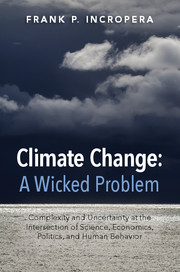 Climate Change: A Wicked Problem
Climate Change: A Wicked Problem Published online by Cambridge University Press: 05 October 2015
“Climate change is occurring, is very likely caused primarily by human activities, and poses significant risks to humans and the environment.” This statement was made in a report prepared by the National Research Council (NRC, 2011), which is an agent of the U.S. National Academies of Science and Engineering and the Institute of Medicine. The view is shared by governmental science agencies across the world, as well as by an overwhelming majority of the global scientific community. We know that atmospheric GHG concentrations are rising, that the gases contribute to warming, and that warming is enhanced by feedback effects. We also know that atmosphere and ocean temperatures are rising, along with sea levels, as Arctic sea ice and glaciers continue to melt. The trends are due to the use of fossil fuels, and we know they will continue, even if atmospheric GHG concentrations were to remain at today's levels. And we are aware of the consequences, such as the impact of rising sea levels on low-lying coastal regions and the increased frequency of extreme weather events.
Yes, there are gaps in the scientific knowledge base. They've been addressed in previous chapters and are acknowledged in the NRC report. But the science underpinning a human impact on climate change is strong and getting stronger with each new study. This part of the debate is all but over. Most uncertainties are associated with partitioning of energy between the Earth's atmosphere and oceans and with understanding the consequences of climate change. Where and to what extent will the frequency and intensity of major storms increase; where will chronic drought and desertification be most pronounced; where and to what extent will ecosystems, biodiversity and agricultural production be adversely affected; and what will be the scope of attendant diasporas? It is not acceptable to focus on these uncertainties and to simply call for more research without addressing root causes of global warming and preparing to deal with the adverse effects of climate change. Because the potential consequences of global warming are profound, the prudent and morally responsible approach is to take action now. The NRC report states unequivocally that “uncertainty is not a reason for inaction.”
To save this book to your Kindle, first ensure no-reply@cambridge.org is added to your Approved Personal Document E-mail List under your Personal Document Settings on the Manage Your Content and Devices page of your Amazon account. Then enter the ‘name’ part of your Kindle email address below. Find out more about saving to your Kindle.
Note you can select to save to either the @free.kindle.com or @kindle.com variations. ‘@free.kindle.com’ emails are free but can only be saved to your device when it is connected to wi-fi. ‘@kindle.com’ emails can be delivered even when you are not connected to wi-fi, but note that service fees apply.
Find out more about the Kindle Personal Document Service.
To save content items to your account, please confirm that you agree to abide by our usage policies. If this is the first time you use this feature, you will be asked to authorise Cambridge Core to connect with your account. Find out more about saving content to Dropbox.
To save content items to your account, please confirm that you agree to abide by our usage policies. If this is the first time you use this feature, you will be asked to authorise Cambridge Core to connect with your account. Find out more about saving content to Google Drive.